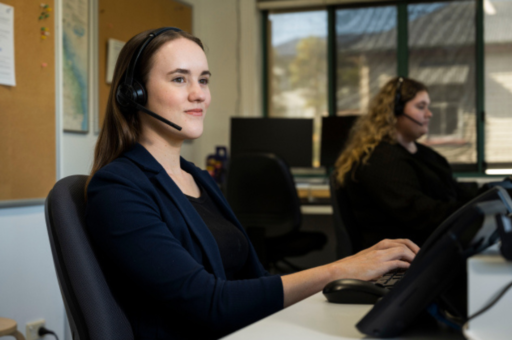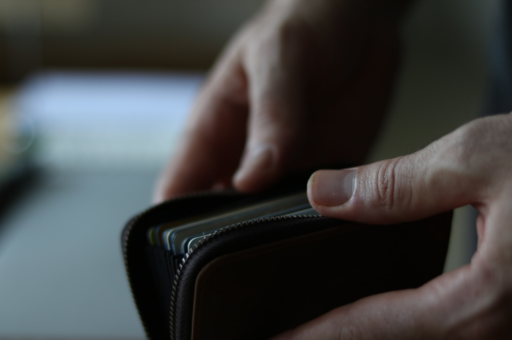
Navigating the justice system: How WLSQ guides women to safety
Jun 18, 2024
This year marks the 40th anniversary of Women’s Legal Service Queensland (WLSQ), a not-for-profit organisation dedicated to providing free legal and social support to women experiencing violence.
We sat down with the organisation’s CEO, Nadia Bromley, to discuss its humble beginnings, the rising demand for their services, and what she believes should be done to address domestic violence in this country.
WLSQ began as a grassroots initiative with a simple mission: to make it easier for women escaping violence to access the legal system.
“It started as an idea from people who saw a gap,” Nadia Bromley recalls. “They were working in shelters with women who were fleeing violence, and found access to the legal system was a significant barrier for these women. So they started volunteering, working with women in refuge or women who called. They got volunteer lawyers on board and it just grew and grew.”
Volunteer lawyers and social workers formed the basis for WLSQ’s integrated service delivery model that remains in place today. This dedication and demand led to government funding, allowing the organisation to start hiring lawyers, expanding its reach and services.
Today, WLSQ operates from five locations across Queensland, with a team of nearly 100 people, including lawyers, social workers, financial counsellors, and corporate supporters, all dedicated to ensuring women receive the support they need.
“We’re the service for women who aren’t going to get legal aid, who don’t have the money for private lawyers, who have a kind of legal problem that no one else will help with,” Nadia says.
A suite of life-changing services
Legal advice and social work remains at the core of WLSQ’s services, helping women navigate the notoriously complex legal system, especially in cases of domestic violence and sexual assault.
“We help guide women through the justice system, from victims of sexual assault to women on temporary visas who are seeking pathways to permanent residency,” Nadia explains.
“Social workers are at the heart of what we do, providing essential safety planning and removing the barriers to access legal and social justice systems. These systems are quite complicated, and then understanding your options and being brave enough to follow them is challenging – and that’s without trauma.
“Our social work team plays an important role in engaging with women, supporting and planning with them, so they can understand the information presented and make safer choices in their lives.”
Most clients are referred to WLSQ through domestic violence or other services, or via the helpline, while others come directly from the courts.
“Our physical sites in Caboolture and Southport are Specialist Domestic Violence Units that handle complex cases, such as women needing court representation or dealing with multifaceted issues,” Nadia says.
“We’ve also partnered with the Domestic Violence Action Centre (DVAC) to conduct monthly clinics in Ipswich, where we identified a significant community need. Due to the high demand, we secured board approval to use our fundraising to open an Ipswich office.”
These initiatives are not government-funded, but are instead supported through WLSQ’s fundraising efforts.
“Our Ipswich office is a pilot project addressing a significant community need. We’re trialing it for two years, providing lawyers, court representation, phone advice, and other services to see its impact.”
For many years, WLSQ have distributed The Handy Guide to women in need of assistance who are victim-survivors of domestic and family violence and located throughout Queensland.
“The Handy Guide is a highly accessible and important resource for service delivery. It’s an invaluable tool that assists our social workers in connecting women with necessary resources and services, ensuring they receive comprehensive support.”
In addition to legal and social work, WLSQ also offers specialist programs that address other areas of a woman’s life impacted by violence.
Their Financial Abuse Prevention Unit, for instance, has cleared over $5 million in debt for more than 500 women, providing a lifeline for those trapped by financial abuse.
“That might look like a $900 debt to Cash Converters, right through to a $260,000 debt to the Australian Tax Office that a woman might not even know about,” she explains.
Growing demand
Reflecting on her path to leading a not-for-profit organisation, Nadia says it was something she always wanted to do. She left her corporate job in 2005, took her first career pay cut and began working at Legal Aid.
“I’d done some volunteer work and placements before, and I knew this was the space I wanted to be in,” she recalls.
Over the next decade, Nadia gathered experience in various roles, including HR, IT and general counsel, each step bringing her closer to her ultimate goal.
“It was a 17-year journey, but I was ready when this opportunity came along,” she says. “It was meant to be.”
Since stepping into the CEO role in 2022, Nadia has seen a staggering increase in the demand for WLSQ’s services.
“We’ve just seen consistent year-on-year increases,” she says. “For example, in 2013, we supported around 5,000 women. Last year, we helped 14,000 women – and we still couldn’t get to them all.”
This rising demand isn’t just seen in the numbers, but also in the complexity of cases.
“We’ve seen an increase in the levels of violence and complexity, with more cases involving visas, children and international matters,” Nadia explains.
The cost of living crisis, housing instability, and other social factors have all contributed to this rise in demand, making the need for support services like WLSQ even more critical.
Bridging the gap
While Nadia acknowledges the government’s efforts to address domestic violence, she points out significant gaps – with the recent announcement of a $5,000 support payment for domestic violence survivors serving as an example.
“Anything that increases the safety of women is good,” she says. “But the reality is, this is a continuation of an existing program with known accessibility issues and extensive paperwork.”
The broader challenge, she says, is translating policy into effective action.
“Unlike most policies, you can’t do a bit at a time. We need healing, intervention and justice responses simultaneously, alongside community education. It needs a great deal of investment and a great deal of focus, and it’s tricky from a government perspective to make that happen.
Ultimately, Nadia says it will take a significant long-term funding commitment and a holistic approach to effect real change.
“It’s probably less than the cost of one expensive submarine,” she says. “This is about changing people’s behaviours, and it’s absolutely something we can change. Even if it’s one-to-one, we can start to make a difference. Meaningful change starts by doing something every day, and the government can commit to every aspect of the pillars that underpin ending violence.
“We have the capacity to do it, and that’s an encouraging thing. When it floods, we can do it. When our state is on fire, we can do it. All of these things are happening to us right now – this is just a different kind of crisis.”
The key to driving change
As WLSQ commemorates its 40th anniversary, Nadia looks ahead with a clear vision for the future.
“We’re focusing on expanding our reach into rural and remote areas and working more closely with First Nations communities,” she says, pointing to the organisation’s first reconciliation action plan as a significant step in this direction.
Through significant fundraising events such as Dancing CEOs, WLSQ plans to develop the financial abuse unit even further.
“At the moment we’ve got one financial counselor and one financial capability worker,” Nadia says. “However, thanks to our fundraising efforts, we’ve already sourced another financial capability worker who will commence in July 2024. Our goal is to have financial capability workers in each of our offices across the state.
“Dancing CEOs is an incredible fundraising event for us, raising $1.3 million this year, which far exceeded our expectations. It's a fantastic example of how community-based fundraising can raise awareness in a positive way.”
While holding the government accountable is essential, Nadia believes real change begins with individual actions.
“So much of it is about gender inequality,” she says. “It’s a significant driver of violence against women. It isn’t going to be solved by policing or by the government alone. It’s about how we engage with our children, and how we educate them. Our own accountability is where the change begins.
“Volunteering, participating in events, and donating to worthy causes are all vital ways the community can contribute.”
As WLSQ continues to grow, Nadia says it will continue to function as a safety net for women who have nowhere else to turn.
“Obviously our mission is to shrink the need for this service,” she says. “But until that gap closes, we exist, and that’s where we’ll be.”




